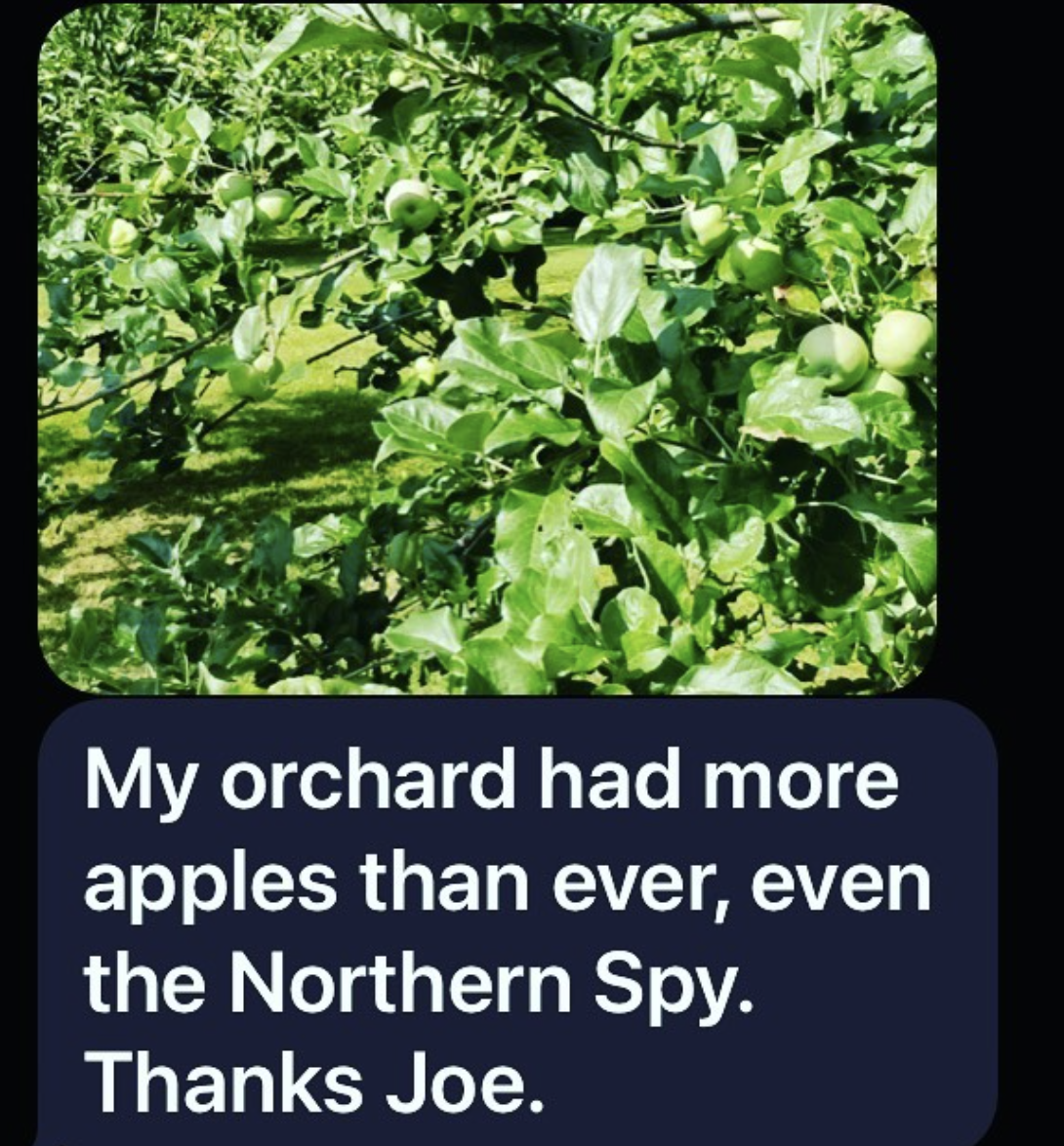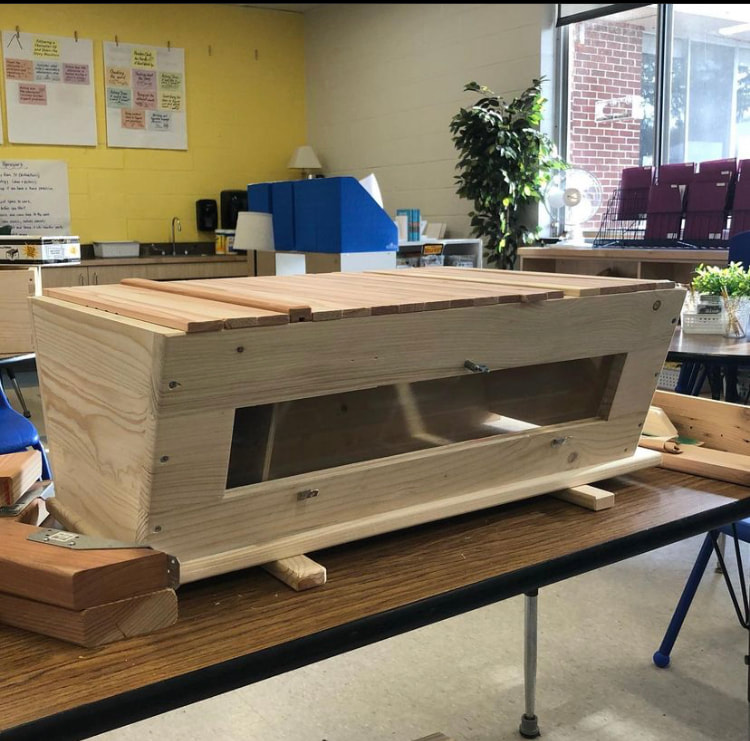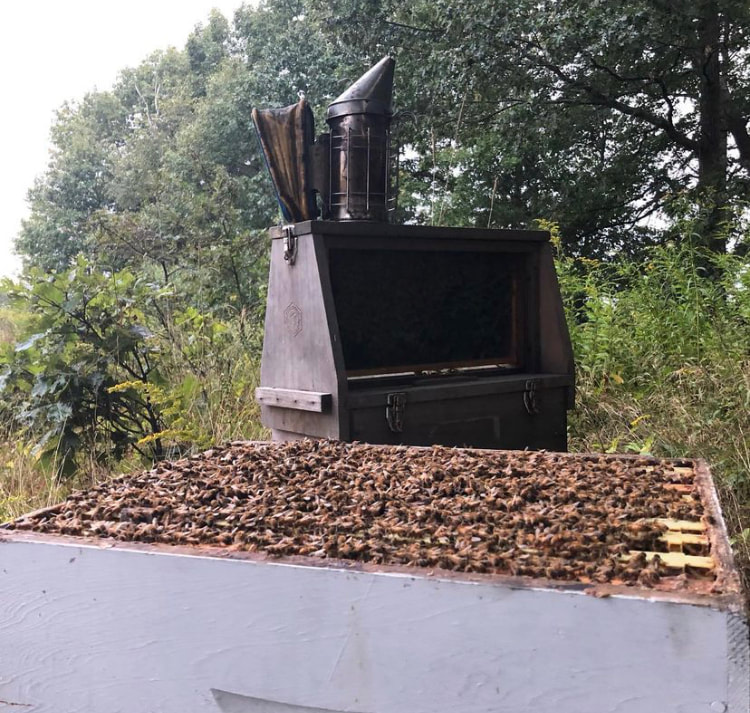|
Recently, we had a request to place an educational hive at a school we have provided pollination presentations to in the past. The Little Harbour Elementary School is located in Portsmouth, NH and borders Little Harbor here on the New Hampshire Seacoast. The group at the school wanted a hive on site to help with their STEM education program. After meeting with the team at the school we decided to place an existing hive along the shoreline that borders the school.
The hive location required us transporting the full hive from another site, across a field, down some stairs on a dock and along some wet marsh. The move was performed during the weekend when no teachers or faculty would be around. The bees took to the location very well and were able to work a large area of golden rod and aster that surround the harbor. Since this post, we have had over 5 presentations from grades 1-5 where we used the bees from this hive to help educate the students. We look forward to working with LHS and our other schools in the coming year.
0 Comments
The Portsmouth Herald's Olivia Falcigno took some great photos on a recent visit to one of our bee yards and the SeaBee Honey House in Rye, NH.
www.seacoastonline.com/picture-gallery/news/2021/06/21/seabee-honeys-apiaries-rye/7746744002/ Our bees have been pollinating various orchards in the seacoast for many years now. However, we had an orchard owner request help recently with his heirloom orchard. Many of the trees had produced sporadic fruit but one tree had not produced fruit for over 20 years.
The barren tree was a Northern Spy which is an older variety and renowned for its fit for desserts and pie. This particular tree had partner pollinators in the orchard but likely not any successful pollination runs by native pollinators or any local honey bees. We even had hives located within a 1/4 mile from this orchard but none of the hives sent foragers that far out. This makes sense since when this tree blossomed there was plenty of forage closer to the hives and there was no need for long trips to this secluded orchard. To get this tree to produce apples we had a simple solution. We only needed to drop a hive in this secluded orchard that was found in a well-manicured clearing surrounded by forest. Placing a hive directly under this tree made a big difference and once the blossoms were out on the Northern Spy our bees were on them gathering pollen and nectar from this tree and surrounding pollination partners. How did they do? This month we received a call and text from the orchard owner who sent us this photo of a well-pollinated Northern Spy with ample fruit. For years, we at SeaBee honey, have worked with our local schools providing free pollination overviews and observation hive visits. In 2020, we helped the folks at the Dondero School in Portsmouth with writing a grant to receive a new bee hive and equipment used to manage the hive. While they provided the equipment, in this case a top bar hive, we provided the honey bees at no cost. We also provided pollinator overviews with the 3rd graders at Dondero that ranged from Pollination 101 to Products of the Hive. With the support of Portsmouth Superintendent, Dondero's Principal and Mrs. McCain we were able to set up a space on the campus that could safely house the hive. Finally, after a one year delay due to Covid-19 we were finally able to hive bees in the top bar hive. In the attached video you will see Mrs. McCain shake out 3lbs of bees into the top bar hive. Great job Mrs. McCain and all the teachers, faculty and students at Dondero! Pollinator Education at the Dondero School For years we have been helping schools with their pollinator education by using PowerPoint presentations, processing frames of honey with our mobile extractor, and the use of an observation hive. In 2019, Sarah McCain from the Dondero School in Portsmouth, NH reached out to SeaBee Honey to ask if we would help assist with their grant application and provide guidance to their pollinator program. This was an endeavor we could not refuse and we offered our services and volunteered to supply the bees for their new hive at no cost.
The grant was approved and we had the chance to visit the school and look at the equipment they had received. The top bar hive was a nice surprise and even has an observation window for the kids to view the bees. We went through the equipment with the team and discussed our next steps which would involve placing bees into the hive in the next few months. We are excited about this new learning experience for us all! 12/1/2016 Seabee Honey to Present at Rye Public Library Topic: Bee Population health and ClimateRead NowWe will be presenting a session on Bee Population Health and Climate at the Rye Public Library on December 6, 2016. The event is once again hosted by the League of Conservation Voters and the details are as follows:
JOIN THE LEAGUE OF CONSERVATION VOTERS and SEABEE HONEY for A DISCUSSION TO HIGHLIGHT THE IMPACT OF CLIMATE CHANGE ON OUR BEE POPULATION Monday, December 5th, 2016 5:30 PM Rye Public Library 581 Washington Road Rye, New Hampshire Bees are losing their habitat due to climate change – changing temperatures and weather conditions has restricted the areas where bees can survive. While climate change threatens many species, bees and other pollinators have received special attention because of the important role they play in agriculture and supporting our food supply. Learn about the important role that bees play in our ecosystem and agriculture and how we can take climate change action! The program will include a discussion with Joe Marttila, owner of SeaBee Honey and manager of apiaries at many New Hampshire farms and orchards. Joe is an experienced beekeeper and will provide background on bee behavior and their importance to our ecosystem and agricultural heritage. For the last couple of years, we have been working with the Rye Conservation Corp and Rockingham County Conservation District to provide pollination education to the community and area schools. Recently, we had students from the Rye Junior High come down to tour the farm, harvest pumpkins they planted in the Spring, and tour the apiary.
We love working with the students and we bring out our charts and educational materials whenever we can to help demonstrate the importance of pollinators. One of the most effective learning aids is the observation hive that allows us to pull a frame of bees from an existing hive and place it in a protected plexiglass construct. This allows us to show the different types of bees, honey, brood, and pollen. Everyone loves to see the queen so we are always sure to have her in the observation hive. If we capture just the right bees at the right time we can demonstrate the bee dance used by foraging bees to communicate the location and type of pollen/honey they have found. While the queen is always a hit a dancing bee is one of the most amazing sites that we can show to a group of students. If you are interested in having a honey bee overview or visit to an apiary please reach out to us to learn how we can make it happen. |
Details
SEABEE HONEY BLOGAuthorA beekeeper in New Hampshire [email protected] Archives
December 2023
Categories
All
|




 RSS Feed
RSS Feed